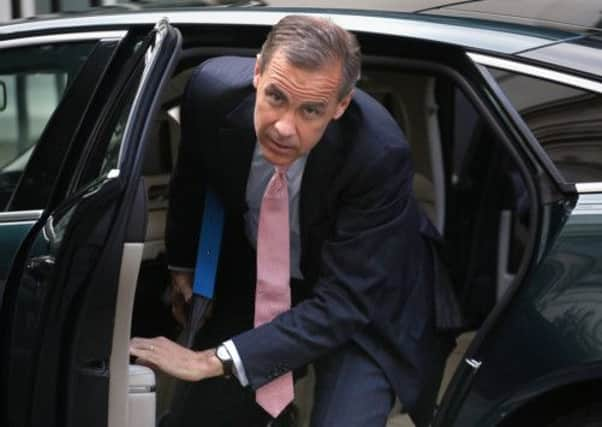Carney interest rate hint boosts FTSE


The FTSE 100 saw its biggest one-day gain since September 2011, surging by 191.8 points or just over 3 per cent, as the Bank’s monetary policy committee (MPC) again held rates at 0.5 per cent and decided against boosting the £375 billion quantitative easing (QE) programme. The surge added £48bn to the value of the biggest 100 companies listed in London.
Mario Draghi, the head of the European Central Bank, also took an unprecedented step of reassuring markets that there were no plans to raise interest rates soon. He said it was expected that ECB rates would remain at current or lower levels for “an extended period of time”.
Advertisement
Hide AdAdvertisement
Hide AdThe MPC’s surprise statement issued alongside its latest decision said that expectations on financial markets of rate hikes were being overplayed.
“In the committee’s view, the implied rise in the expected future path of the bank rate was not warranted by the recent developments in the domestic economy,” it said in a move seen as part of the so-called “forward guidance” on the future path of interest rates.
Alister Gaines, director of CDC Wealth Management said the comments meant the prospect of interest rate changes in the UK and the eurozone had been kicked “firmly into the long grass” and that European markets had breathed a collective sigh of relief.
The MPC statement, which triggered a fall in the value of sterling against the dollar to its weakest level since late May, was also seen as a sign by economists that the Bank of England was likely to adopt Fed-style forward guidance on interest rates in August to put more direct downward pressure on yields.
Scott Corfe, senior economist at the Centre for Economics and Business Research, said he believed introducing forward guidance would help kick-start investment by businesses.
“If policymakers can credibly convince businesses that interest rates will remain at rock bottom levels for several more years, they may become more willing to make investment plans. By removing one element of economic uncertainty, Carney may be able to put the UK economy on firmer ground.”
Stephen Gifford, CBI director of economics, said recent financial market volatility and yesterday’s statement by the Bank had “strengthened the case for providing greater clarity around monetary policy, which businesses would welcome”.
A hat-trick of positive data from the manufacturing, construction and services sector this week dispelled any immediate pressure on Carney to boost QE as he began his five-year term as Governor. But many economists expect that, with gross domestic product still lagging behind its pre-recession peak, it is only a matter of time before the Canadian will feel fresh action is necessary to achieve “escape velocity” to lift the UK out of the doldrums.
Advertisement
Hide AdAdvertisement
Hide AdIt was suggested by commentators that Carney would be unlikely to go out on a limb and push for more QE, risking defeat by fellow members of the nine-strong body in his first week in the job.
It is thought Carney will not have wanted to emulate a successive run of defeats for predecessor Sir Mervyn King, whose calls for a £25bn boost to the stimulus programme were repeatedly rejected by a 6-3 majority during his final months in office.